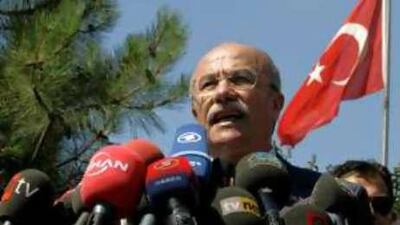ISTANBUL // In a case that could become a turning point for democracy in Turkey, a senior state prosecutor yesterday published an indictment against a group of suspected right-wing extremists, who are accused of planning a coup against the government. In Turkey, a country that has seen four elected governments removed from power by military pressure since 1960, the investigation could lead to a strengthening of the rule of law, some observers say. Aykut Cengiz Engin, Istanbul's top prosecutor, said 86 suspects, of whom 48 are in custody, had been charged with creating, belonging to, or supporting an armed terrorist organisation, Ergenekon, with the aim of overthrowing the government of Recep Tayyip Erdogan, the prime minister. The charges carry a maximum penalty of life in prison. "The investigation is ongoing," Mr Engin said. "When it is finished, there will be additional indictments." He was referring to former four-star generals Sener Eruygur and Hursit Tolon, who were arrested on July 1 and are suspected of having played crucial roles in the activities of Ergenekon. Veli Kucuk, another former general, has been in custody for several months and was charged yesterday. Mr Engin refused to go into details of the charges, but media reports said Ergenekon wanted to create an atmosphere of chaos in the country by terrorist attacks and mass demonstrations to provoke the army to step in and take power. He said the group's members were accused of instigating the killing of a leading judge in Ankara and a string of hand-grenade attacks on the building of the leading opposition newspaper, Cumhuriyet, in Istanbul in 2006. At the time, the incidents were blamed on radical Islamists. "In short, the 2,500 pages strong indictment says that the state's generals had the state's judges killed," Gazeteport, a news website, said. Mr Engin said "coup diaries" of a former admiral, which were published by a news magazine last year and tell of plans for two coup attempts hatched by Eruygur in 2004, had not been included in the indictment. Ozden Ornek, the former admiral, has denied that he kept the diary. A court in Istanbul will decide within 15 days whether to open the trial. Mr Engin said further details of the indictment could be published then. Opposition politicians have accused Mr Erdogan's government of using the investigation to intimidate opponents shortly before the constitutional court is to reach a verdict in a trial that could lead to a ban of his ruling Justice and Development Party, or AKP. Critics point to the arrest of prominent editors and reporters of Cumhuriyet and to the fact that the latest wave of arrests of suspected Ergenekon members came on July 1, the day the prosecution presented its final argument against the AKP before the court. The AKP has denied any involvement in the Ergenekon investigation. Commentators say the real significance of the investigation lies far beyond the AKP trial and the bickering between the government and the opposition. "The Ergenekon investigation is a very serious investigation and an important milestone in the fight for democracy in Turkey," wrote Cengiz Candar in Referans, a daily financial newspaper. "It is maybe the first time that Turkey's civilian justice system is investigating a coup attempt," wrote Ergun Babahan, editor-in-chief of the pro-government daily newspaper Sabah. "This is an important development from the point of view of democratic maturity." But early reactions to the indictment suggested that Mr Engin's statement was not enough to defuse the feeling among Mr Erdogan's opponents that the Ergenekon investigations had political aims. Mustafa Ozyurek, a spokesman for the Republican People's Party, the main opposition party, said there were serious contradictions in the indictment. It seems these people [Ergenekon] are being accused of bombing their own newspaper [Cumhuriyet]," Mr Ozyurek said. The investigation against Ergenekon, a name that refers to a legend about the Turks' mythological home, started last summer after police found a weapons cache in a house in Umraniye, a suburb of Istanbul. In the past few months, investigators arrested suspects that include academics, the leader of a small nationalist party, businessmen and lawyers, and former soldiers. The identity of key witnesses will not revealed for fear of reprisals, newspaper reports said. The witnesses will benefit from a recently introduced witness protection programme that could even provide them with plastic surgery to change their appearance, the reports said. @Email:tseibert@thenational.ae

Turkey charges 86 over coup bid
The investigation is seen as a milestone in the fight for democracy in Turkey.
Most popular today
